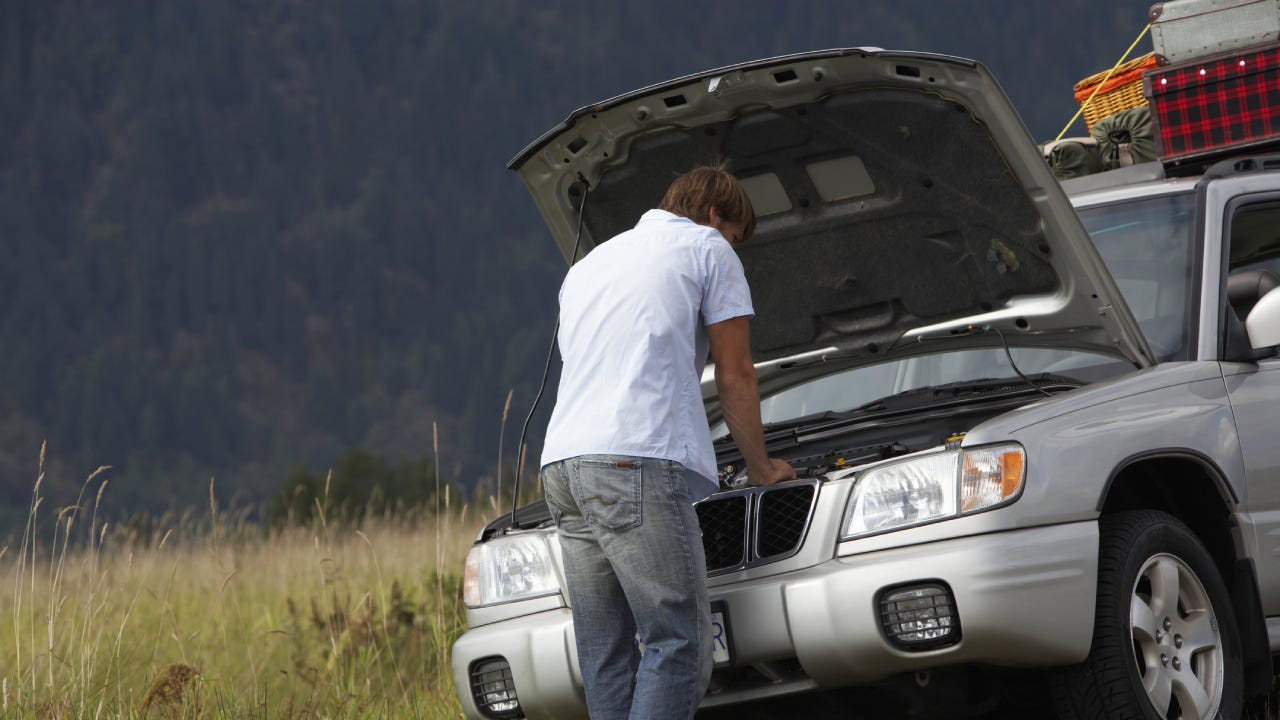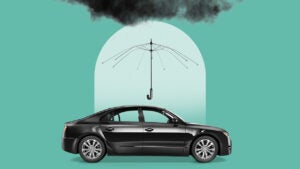Mechanical breakdown insurance

There’s plenty of debate about whether old cars or new cars are more reliable, but one thing everyone agrees on: repair costs are only getting more expensive. While mechanical failures have been a problem for both new and old cars alike, fixing the complex safety and technology features in modern vehicles has become especially costly. For extra financial protection against these unexpected malfunctions, mechanical breakdown insurance can be a smart option. Here’s what mechanical breakdown insurance covers, how it differs from extended warranties and what to consider before deciding if it’s right for you.
What is mechanical breakdown insurance?
Mechanical breakdown insurance, also called MBI or car repair insurance, is a type of insurance policy or an endorsement to your auto insurance policy that helps cover the cost of repairs for unexpected mechanical and electrical malfunctions. For the sake of differentiation, MBI is dedicated to protecting the internal functionality of your vehicle, while your auto insurance policy accounts for incidents that occur where damage is caused or sustained.
Every car insurance company covers different repairs, but most mechanical breakdown insurance plans generally cover key systems and components such as:
- Brakes
- Drivetrain
- Engine
- Exhaust
- Steering
- Transmission
- Anti-lock braking system (ABS)
- Airbags
- Heating and cooling system
- Internal computer and GPS
- Blind spot detection system
- Lane departure warning system
- Back-up camera
- Adaptive cruise control
However, for mechanical breakdown insurance to provide coverage, the failure has to be a true failure and not caused by general wear and tear or neglect. Using brakes as an example, MBI would not cover replacing brake pads that have worn down over time, since that’s considered routine maintenance. But if a component of the brake suddenly fails due to a mechanical defect, that kind of repair could be covered.
It’s also important to note that mechanical breakdown insurance does not cover pre-existing issues. In many cases, your provider may require an inspection to ensure there are no imminent failures — or claims — on the near horizon. Along those same lines, it’s not uncommon for MBI providers to impose strict age and mileage eligibility requirements. After all, it would be poor business practice to offer this type of coverage to vehicles that are already on the brink of a major breakdown.
Despite the term “breakdown,” mechanical breakdown insurance is not the same thing as roadside assistance, which is sometimes called car breakdown insurance. MBI won’t cover towing if you break down on the side of the road. However, if your car broke down because of engine failure or transmission issues, mechanical breakdown insurance would help cover the cost of repairs at an auto body shop.
How does mechanical breakdown insurance work?
You don’t really get to choose when your car decides to break down, which is why mechanical breakdown insurance often includes added perks such as stipends for lodging or a rental car while your vehicle is being repaired — just because your car is in the shop doesn’t mean your life has to stop!
When a mechanical failure does unfortunately occur, MBI works much like regular car insurance. You contact your insurance provider to file a claim, and depending on the issue, you may need to take your car to a mechanic for an estimate. Once your claim is approved, you’ll receive a payout to cover the repair costs, minus your deductible. Most insurers allow you to choose your own mechanic, but some have a list of preferred mechanics that must be utilized.
How much does mechanical breakdown insurance cost?
The cost of car repair insurance varies based on a number of factors, the first of which is the company that you purchase your coverage from. Every company sets its own rates, and just like with the cost of auto insurance, prices will vary. Additionally, you may pay more if you purchase a standalone mechanical breakdown policy rather than adding coverage as an endorsement to your auto insurance policy.
The type of car you drive could also impact the cost of this coverage. The cost for mechanical breakdown insurance will likely be higher for vehicles that cost more to repair. For example, because luxury cars will typically cost more to fix than standard private passenger cars, car repair coverage for a luxury vehicle will likely be more expensive than it is for your daily car.
What is the difference between mechanical breakdown insurance and an extended warranty?
Mechanical breakdown insurance is similar to an extended warranty or service contract in that they both cover the cost of certain vehicle repairs. However, there are a number of key differences:
- Cost: MBI is usually less expensive, requires a deductible and can be paid in installments. Extended warranties tend to be more costly, often have no deductible and usually require full payment upfront — averaging between $1,300 and $4,600 per year.
- Regulation: MBI is regulated by state insurance departments, offering stronger consumer protections and standardized claims processes. Extended warranties are generally sold as service contracts which tend to have less clear consumer protections and unpredictable claims handling.
- Eligibility: MBI is generally reserved for newer, low-mileage vehicles. Extended warranties are available for older or higher-mileage vehicles, offering more flexibility.
- Claims: MBI claims are handled like insurance claims and typically allow you to choose your mechanic. Extended warranties often require prior approval and repairs at approved shops.
Which companies offer mechanical breakdown insurance?
If you’d like to purchase MBI through an insurance provider, then Geico, AAA and Mercury are notable options, although regional availability may apply.
Other insurance companies, third-party providers and credit unions may offer products that resemble mechanical breakdown insurance, but they may actually be service contracts or extended warranties. Because there can be key differences in cost, coverage, eligibility and exclusions, it’s important to read the fine print and understand what guarantees you’re actually getting before you buy.
Is mechanical breakdown insurance worth it?
Ultimately, purchasing mechanical breakdown insurance is a personal decision. It may be worth it for some and not for others.
For example, if you need to replace your engine, it might cost $4,000. That’s significantly more than you are likely to spend on the insurance coverage and deductible. Newer cars also come with advanced driver-safety features that can be costly to repair if an electrical malfunction occurs. In situations like these, mechanical breakdown coverage can help you avoid significant out-of-pocket expenses.
However, consider a less expensive repair. Say you need to replace your steering column, which might cost $300. If you’re paying $100 for insurance and have a $250 deductible, you’re paying more money out-of-pocket for insurance than the cost of the repair. In that case, you’re not saving any money by having mechanical breakdown insurance.
That said, choosing mechanical breakdown coverage isn’t just a numbers game — it’s a choice for peace of mind. With your standard car insurance, you have the power to reduce your risk of filing a claim through safe driving. But breakdowns can happen without warning, no matter how well you maintain your vehicle. Having MBI means you’re prepared for the unexpected, so when your car lets you down, you’re not left stranded or facing a costly repair bill alone.
One last tip for new car owners: if your vehicle is still covered by the manufacturer’s warranty, buying mechanical breakdown insurance might mean you’re paying for overlapping coverage. MBI can be a useful supplement if there are gaps in your warranty, but it’s important to carefully review the fine print to understand exactly what’s covered.
MBI for used cars
Mechanical breakdown insurance for used cars is not as widely available. For example, Geico requires that you be the original owner of the vehicle to purchase mechanical breakdown insurance. Once enrolled, coverage can be renewed for up to seven years or 100,000 miles, whichever comes first.
If you have a used car and want protection against breakdowns, you’ll most likely need to consider a service contract or extended warranty. Progressive offers a service contract that functions similarly to mechanical breakdown insurance, providing coverage for vehicles up to 15 model years old with fewer than 100,000 miles. The key difference is that Progressive uses a third-party provider (Good Sam) to administer the policy, so it is not subject to the same regulations as a true mechanical breakdown insurance policy.
Obviously, as your car gets older and racks up miles, finding any kind of protection against breakdowns becomes more challenging — and eventually, nearly impossible. At some point, the risk of insuring a clunky, high-mileage vehicle is just too great for providers to take on.
Frequently asked questions
Why we ask for feedback Your feedback helps us improve our content and services. It takes less than a minute to complete.
Your responses are anonymous and will only be used for improving our website.






